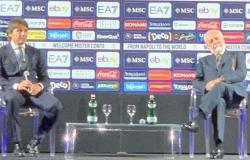«Heteroaffectivity and homoaffection are different, but natural, variants of human sexuality». This is the heart of the declarations of Dr. Chiara D’Urbano, psychologist and psychotherapist, consultant of the Dicastery for the Clergy and expert of the Roman Rota, of the Tribunal of the Vatican City State and of the Vicariate of Rome, for the newspaper Future (Sunday 9 June, p. 20).
Luciano Moia’s interview represents «the first step of an in-depth journey That Future will continue on its pages”, after the media case caused by the “faggots” of Pope Francis. The newspaper of the Italian Bishops therefore takes the field to push towards the official opening (because the unofficial one has been a reality for some time) of seminaries and convents to gay candidates, after the Pope’s statement during the 79th General Assembly of the Italian Episcopal Conference it seemed to have marked a definitive stop. Moia is keen to point out that, in truth, the Pope’s expression would have been misunderstood, and would have opened a debate “often carried out inappropriately, as if those words endorsed a negative judgment against homosexuality”. In Wonderland, where Moia lives, the expression “faggot” does not support a negative judgment… If we had used it, rather than the Pope, at the very least he would have accused us of dangerous homophobia.
Let’s get back to the topic of the interview. Dr. Chiara D’Urbano therefore explains to us that homosexuality is one of the two possible affective orientations, thus moving from the terrible male-female gender binary to a new homo-hetero binary: «homosexuality and heterosexuality indicate the direction of “loving well”, rather than its quality». Two simply different directions of “loving well”, therefore.
«It is essential to understand that in homo-affection there is no underlying vulnerability, perhaps linked to a structural or developmental deficit (…). To state otherwise would be unscientific and lacking in consistency.” D’Urbano, who offers psychotherapy services above all to seminarians, priests and religious people, and is involved in training at seminaries and convents, has essentially dismissed the psychogenetic etiological hypothesis of homosexuality, supported with different emphasis , by psychologists such as Alfred Adler, Carl Gustav Jung, Wilhelm Reich, Jacques Lacan, Victor Frankl, Irving Bieber, Elizabeth Moberly, Paolo Ferliga and many others. All, evidently, anti-scientific.
The hypothesis of fragility of the homosexual person has been eliminated, probable outcome of a problem experienced by the person especially in the dynamics of attachment and identification with parental figures, the admission of homo candidates to the priesthood clearly no longer represents any problem: «The real threats to the vocation – sentence of the D’ Urban – they are mismanaged power, the role when it becomes a weapon, the desire for money, the thirst for a career. These can damage oneself, others, the Church, not sexual orientation (homosexual).”
D’Urbano shows a great ability to jump on the bandwagon of trends: in addition to zealously embracing the position of homosexuality as a natural orientation, which has established itself in the world of psychologists and in the cultural world very scientifically, that is to the sound of censorship and threats towards those who think differently, it also saw fit to propose itself as a sponsor “scientific” obsession of this pontificate: clericalism. There is no doubt that greed and ambition are a plague that needs to be eradicated, but in this context it is a matter of pulling the wool over our eyes so as not to get to the heart of the matter.
From someone who is not simply a psychologist and psychotherapist, but who holds important roles within the Catholic Church, one would expect him to center the topic on the basis of a theological anthropology based on Christian Revelation, perhaps in the light of the magisterial teaching of John Paul II. We ask: what relationship does the sexual differentiation that marks our corporeality have with the person’s emotional development? Are our corporeity and our psychological-affective dimension communicating or independent? Does our corporeity bear a meaning, or is it a frill that has nothing to say to being a person?
When the Church reiterates that the trends homosexuals are objectively disordered does not want to make a moral judgment on the person (a judgment which is instead applied to acts sodomites), but expresses a judgment of an anthropological nature: that tendency goes in an objectively contrary direction to what is signified by corporeity. The more deeply rooted it is, the more the person will experience a profound split between what their body says and the direction of their affective tendency.
Questions whose answers depend on another more fundamental question: when God creates Tizio male and Tizia female, does he do it randomly? Does our being created male or female still have meaning, does it still contain a specific vocation, or is it a determination that makes no sense? God therefore creates and works without sense, or even nonsense, since he would create a person in a male body, which expresses openness to female otherness (and vice versa), but then giving him an affective orientation opposite to that expressed by his corporeality ?
The position ridden by Future it doesn’t just turn Christian anthropology upside down, but also the sacramental sense of the priestly vocation. The priest lives, in his celibacy, not a simple continence (from which the equation between homo priests and hetero priests would derive, as long as they are “chaste”), but a spousal relationship towards the Church. Priestly celibacy is not a mutilation, but a sublimation of one’s emotional resources, which are oriented (or at least should be) entirely towards the Church-bride, by reason of one’s sacramental union with Christ, head and husband. For this reason the priesthood is forbidden to women, whose body does not express this spousality of Christ, but is instead open to welcoming the spousality of the Lord; and for this reason the priesthood is not accessible to those who have a deep-rooted homosexual tendency: their affectivity is in fact not objectively oriented in the direction imprinted on their body, which expresses a male spousality, which must love with all of itself the female polarity of the Church .
Evidently neither at D’Urbano nor at Moianor to the clique of Future these trifles seem to be of interest, which after all are nothing other than the expression of theology, anthropology, sacramentaria, the sense of the Incarnation and the foundation of the Church. All expendable realities in the face of the paradigm shift.




